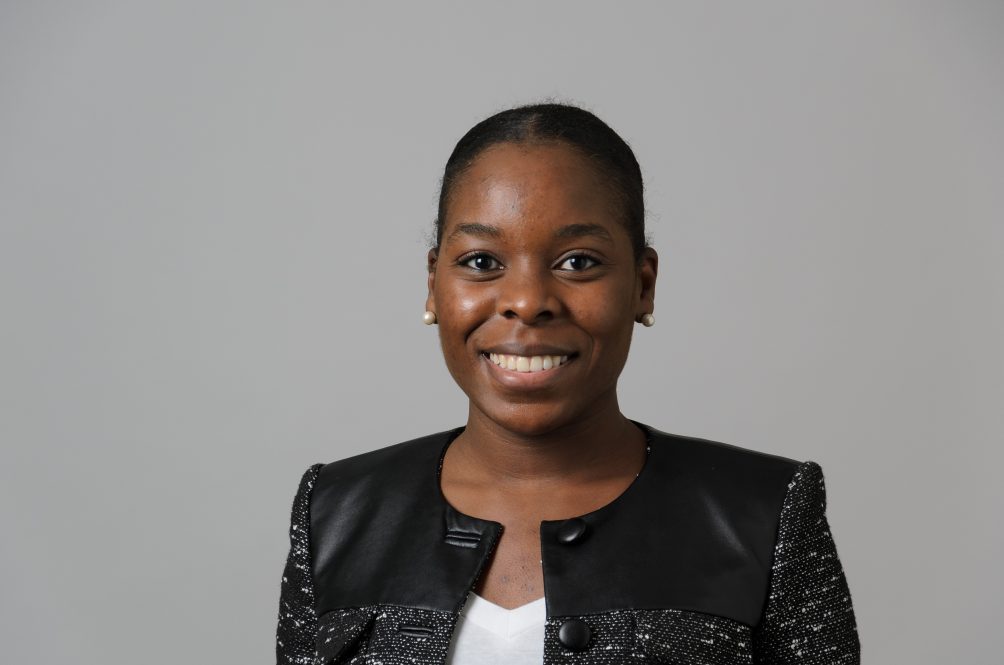Black Sisters Optimizing Unity & Leadership (BSOUL House) is a new learning community (LC) in the Office of First Year Programs & Learning Communities (FYP) and is designed to support the scholastic efforts of female students who identify as African American/Black through academic and social/emotional support, access to research opportunities, and professional development.
“As a faculty member and former student, I have an intimate understanding of the challenges BIPOC students, specifically Black women, can experience in predominantly white institutions, and I’m also a testament to the value of creating affirming spaces for BIPOC students,” says Anyanwu. “I’m excited to serve in this role, to continue the efforts of the individuals who worked tirelessly to create this much needed space for Black women on campus, and most importantly to engage and advise these students beyond the classroom while nurturing their boldness, compassion, and integrity.”
Anyanwu, a UConn School of Pharmacy alum (’09), is an Assistant Clinical Professor of Pharmacy Practice at the school. Her research interests broadly focus on examining the impact of systemic racism on health disparities, and more specifically centers on improving the provision of pharmaceutical care for racial/ethnic minorities through community-based interventions, policy change, and advocacy. Additionally, she investigates the dynamic relationship between culture and health, examining how cultural factors influence health behaviors, as well as the recruitment and retention of under-represented minority students in health profession schools. She currently serves as faculty advisor for the School of Pharmacy’s Diversity Committee and leads the school’s Students of Color Mentorship Program.
During her time as a pharmacy student at UConn, Anyanwu’s dedication to addressing health disparities blossomed through her active involvement in the Student National Pharmaceutical Association (SNPhA) and the Urban Service Track Program (UST). This continued throughout her professional career. Her commitment was evident through her volunteer work with non-profit organizations like the African Women’s Cancer Awareness Association, as well as her membership in professional organizations like the National Pharmaceutical Association and Pharmacy Initiative Leaders.
Anyanwu now joins the FYP family as the faculty director of BSOUL House. She will oversee a student leadership team made up of RAs, GAs, and student mentors and lead a cohort of 60 students. First and second year students in the learning community will participate in FYP courses to help orient them to UConn and the themes of BSOUL House. They will also participate in special programming and events outside of the classroom that highlight the importance of being one’s true authentic self while navigating the higher education space. She is committed to centering the students’ voices in all aspects of the learning community, including curriculum and programming development. In doing so, she hopes to ensure all activities are relevant to the students’ priorities and are implemented in ways that focus on their strengths.
Melissa Foreman, Director of the Learning Community program and Assistant Director of First Year Programs and Learning Communities shared, “We are excited about the launch of BSOUL House that, under Dr. Anyanwu’s direction, will serve to elevate the experience of Black women at UConn. Through academic, experiential, and residential engagement, Learning Communities provide new students with a culture of support and layers of mentoring that help them feel a sense of belonging earlier in their transition to college while also connecting them to resources and opportunities. In addition to serving as a recruitment tool for UConn, they also are a space where we can provide academic and personal support, track student progress, and identify and overcome barriers that impact student success, leading to better outcomes for participants.”



